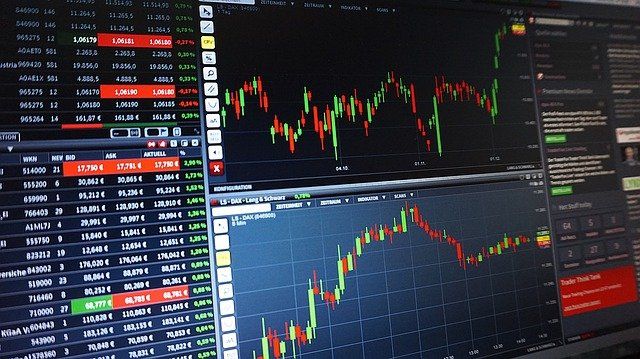Top AI ETF - Best Artificial Intelligence ETFs To Invest
AI stocks are a wonderful investment, but the difficulty is that pure AI and robotics stocks are volatile and unpredictable. This issue is addressed by AI ETFs, which provide a diverse set of AI equities to mitigate risk. In recent years, exchange-traded funds (ETFs) have exploded in popularity.

With each passing day, Artificial Intelligence (AI) is becoming popular by gaining entry into our daily lives through multiple avenues. AI is induced in multiple fields to replace humans or to improve the efficiencies in certain systems where humans have limitations. It is benefiting multiple industries including manufacturing, finance, technology, robotics, automobiles, and many more. It has made its place worth billions of dollars with multiple applications like face recognition in phones, the predictive algorithm for multiple uses, machine learning, smart home appliances, self-driven cars, and by performing certain tasks on industrial assembly lines. Based on AI’s rapid growth and its dominance in multiple industries, it is not surprising that AI is considered an attractive technology that can give a massive boost to productivity in many fields. AI is a chief driver of growth and innovation for several industries and has positioned itself as the top investing trend of today. For investors, the companies that are creating or adopting AI are of great worth and they are investing extensively in the evolution of this nascent industry.
What is an ETF?
An ETF is a pool of securities that trade on the exchange and track an essential index. An ETF encompasses all sorts of investments such as individual stocks, currencies, bonds, commodities, or any other investment. Someone who buys a share of an ETF owns a fraction of that collection of investments. Some ETFs have only US-based holdings while others are comprised of international holdings. ETFs are similar in a few ways to mutual funds, however, the main difference is that these ETFs are planned on exchanges and we can trade on them throughout the day just as in the case of traditional stocks. In August 2021, total global investment in ETFs was $9 trillion where major portion i.e., $6.6 trillion was invested in the USA.

Why Invest in AI ETF?
The pandemic has increased the adoption of AI and now it is on its way to becoming ubiquitous in all businesses sectors. According to analytics insight, the worldwide AI market will grow at a CAGR of 29% by 2023.They also project that its value that was $42.8 billion in 2019 will increase to $152.9 billion by 2023. IDC predicts that AI global services market would reach $50 billion by 2025 that will make it the most rapidly growing sub-segment of AI over a period of five years. According to an estimate, the companies would be mostly relying on AI solutions and would be spending $310 billion dollars on them. It proves AI is a dynamic evolving market where tech giants are continuously driving research and innovations. This tech niche is projected to grow at a CAGR (Compound Annual Growth Rate) of 40% from 2021 to 2028.
Based on AI’s huge potential, the value in AI investments reached $68 billion in 2020. Investors are seriously eager to invest in AI-based industries in one way or the other. AI Stocks are no doubt a good investment but the problem that investors have to face is that pure AI and Robotics stocks are very small, unpredictable, volatile, and risky. This problem is somehow resolved through AI ETFs by providing a bunch of AI stocks to cover the risk. ETFs have gained immense popularity in the recent few years. The main reasons behind this popularity include:
- ETFs offer easy accessibility to a wide range of sectors and industries.
- ETFs reduce the risk factors induced while investing in individual stocks.
Hence through ETFs, the investors spread the exposure across the related industries and the risk factor for a single company is lower down. AI ETFs hold a pool of shares of firms dealing in AI and hence ease out the problem of investors as they don’t have to select a single most outperforming firm to invest in. The benefit of risk coverage is obvious when you pick a bunch of progressing stocks in one trade.
In the US market almost 29 ETFs are being traded, out of which the number of AI ETFs is six and this number does not include leveraged or inverse funds and AUMs (Assets under Management) under $50 million. The total AUM (Assets under Management) for these AI ETFs in the USA is $10.68B with a 0.68% average expense ratio.

The best AI ETFs to invest in?
For an investor, choosing the best AI ETF is a subjective exercise. Some investors have interests in a fund that is primarily focused on AI stocks, whereas some investors prefer a tech stock fund allocating a portion of its assets to AI stocks. Let’s discuss top ETFs of Artificial Intelligence considered the future of the world’s economy and a huge opportunity for the investors:
BOTZ – Global X Robotics & Artificial Intelligence ETF:
This ETF was launched in 2016 by Mirae Asset Global Investments Co., Ltd. About BOTZ we can say it is a pure AI and Robotics based ETF. Its primary exchange is NASDAQ. This fund covers technological and industrial stocks involved in Artificial intelligence & Robotics and mainly from developed countries. The objective of this ETF is to deliver investment results corresponding to the yield performance and price, before expenses and fees. This fund is considered good for investors targeting companies with clearly stated business intentions in artificial intelligence and robotics.
BOTZ encompass 35.9% IT sector, 34.5% Industrials, 12.7% Health care, 10.9% communication services, 5.7% consumer discretionary and 0.3% energy. Its country-wise breakdown mainly includes the US (48.7%), Japan (33.2%), Switzerland (10.9%). It has 36 holdings including NASDAQ: UPST 10.84% (UPSTART HOLDING INC; a cloud-based AI platform for lending that connects lending companies with borrowers), NASDAQ: NVDA 9.84% (NVIDIA CORP,), and OTC: KYCCF 8.25% (a Japan-based company manufacturing automation products like scanners and sensors) and many more.
The net assets of BOTZ (AUM) are over $2.88 Billion but it is relatively expensive having an expense ratio of 0.68%. Its return on equity is 12.80%. Market Cap is 48,555M. BOTZ has 0.27$ of annual savings that is pretty notable.
ROBO – ROBO Global Robotics & Automation Index ETF
It is an open-ended fund that was launched in 2013 by Exchange Traded Concepts. In the first three years after its launch, it toiled in obscurity. However, by the end of 2016, it managed $100 million in assets. For geographical spread, ROBO is mainly concentrated in the United States (50%) and Taiwan (7.4%). ROBO tracks a worldwide index of enterprises dealing in Robotics and AI targeting mainly the companies involved in making devices, sensors, or accessories related to Artificial intelligence and Robotics.
This fund is very similar to BOTZ in scope but focuses majorly on mid-cap stocks and less on large-cap ones. ROBO with higher holdings at 89 is considered less volatile and therefore carries fewer returns than BOTZ historically. Its top holdings include NASDAQ: BRKS (Books Automation), NASDAQ: IRTC (iRhythm Technologies, a company focusing on cardiac monitoring), and NASDAQ: SSYS (Stratasys).
ROBO ETF is considered less popular than BOTZ with its AUM of $1.8 billion and more expensive carrying an expense ratio of 0.95%. Its performance over one year is 40.5% with an annual dividend yield of 0.18%. Its average daily volume for three months is 81,840. As the major holdings in this ETF are not common or household names so the investors targeting small, and more volatile companies prefer investment in ROBO as compared to BOTZ.

QQQ - Invesco QQQ
Invesco QQQ is a renowned ETF as it tracks the NASDAQ- 100 Index which combines 100 functionally important NASDAQ stocks in your basket of the portfolio. NASDAQ is a tech fund in which major holdings fall in the technology category along with the telecommunication industry. Although it’s not purely an AI-based fund, however, it is majorly influenced by the players mainly involved in artificial intelligence or its allied products. We can say that around two-thirds is the contribution by the tech and communication company’s stocks in this fund. Major sectors contributing in this ETF are Information technology (48.3%), Communications services (19.14%), Consumer discretionary (19%), Health Care (6.6%), Consumer Staples (4.7%), Industrials (2.8%) and Utilities (0.6%).
QQQ is the most suitable combo of AI and Technology. It has 100 stock holdings from multiple sectors. Its top holdings include NASDAQ:AAPL (13.39%), NASDAQ: MSFT (10.76%), NASDAQ:AMZN(10.66%), NASDAQ:FB(4.26%), NASDAQ:TSLA (3.45%), NASDAQ:GOOGL (3.42%), NASDAQ:NVDA (2.88%), NASDAQ:PYPL (1.99%) and stocks of other similar innovation loving companies.
This fund is getting popular with assets exceeding 182 billion dollars while the expense ratio of 0.2%. So investment in this ETF is considered safe and less vulnerable. Performance of QQQ is remarkable with returns of 15.2% (including dividends paid) on annual basis over the past 15 years while if we consider the last 5 years, returns are approaching 22.1% annually.
QQQ is a fantastic buy for bullish traders who want to buy and sell an ETF at a reduced cost on frequent basis. However, the active traders need also to be conscious that this ETF when goes down, can lose much greater than the S&P 500.
VGT – Vanguard Information Technology ETF
Vanguard Information Technology ETF was launched in 2004. Vanguard offers this fund with real-time pricing. This fund is based on a passively managed strategy with full replication. However, if regulatory limitations do not allow full replication, this ETF employs a sampling strategy to project the key characteristics of the index. The portfolio professionals handle this ETF and this is commission-free.
This ETF compiles mainly tech stocks excluding healthcare and telecommunications as in the case of QQQ. It has 342 holdings encompassing large caps of tech companies like AAPL (19.68%), MSFT (16.81%), NVDA (4.30%), and many more.
This ETF trails MSCI’s investment performance US IMI IT 25/50 index. This is its benchmark.
This ETF is worth over 43 Billion Dollars and has an expense ratio of 0.10%. Its YTD Returns is 25.00%, while dividend yield is 0.73%. Its total net assets are $60.9B. Its turnover rate by the end of the fiscal year is 1.20% as calculated on 31st august 2021.
VGT is a good option for investors who don’t have any allocation to the technology sector before and want to get diversified exposure to the technology sector at a reduced management fee of just 0.10%.

ARKQ- ARK Autonomous Technology & Robotics ETF
ARKQ, launched in 2014 by ARK is a popular and well-managed ETF that targets industries that benefit most from artificial intelligence and automation. It contains a bunch of multi-cap equities and the fund’s managers are interested mainly in 3 Dimensional printing, automation, autonomous driving, and energy storage. This ETF is geologically expanded across developed markets following the growth strategy.
ARKQ is mainly focused in the US (82%) while it carries very small liquidity of about 600 million dollars which is quite less than other ETFs. This ETF has 39 stock holdings. Its top holdings include NASDAQ: TSLA 10.34% (Tesla), NASDAQ:BIDU 5.36% (Baidu Inc.), NASDAQ: TRMB 5.35% (Trimble), NASDAQ: KTOS 3.92% (Kratos Defense & Security Solutions), and.
Till Aug 2021, the past year's performance of this ETF was 45.1% with a 0.75% expense ratio and $2.7B AUM. The annual dividend yield of this ETF is 0.80% while avg. the daily volume of three months is 356,112.
ARKQ delivers the same benefits as in case of mutual fund but its fee is much lower than that of a mutual fund i.e., just 0.23%.
IRBO: iShares Robotics and Artificial Intelligence ETF
IRBO launched in 2018 trails the index results of emerging markets companies in Robotics and AI. This ETF mainly targets the sector of Information Technology (61.63%) and is mainly focused in the US (56.93%), China (10.97%), and Japan (9.8%).
It is a well-diversified ETF with 105 stock holdings. Its top stock holdings include NASDAQ: AMBA (Ambarella, a semiconductor company designing components for chips), OTC: NEMTF (Nemetschek, a software company based in Japan providing services to social media, architecture, and construction industry). Most of its top holdings furnish the investors with exposure to small-cap companies that are fast-growing. Cloud stocks influence the performance of this ETF more than any other stock because it is more exposed to chipmakers and cloud stocks as compared to AI companies.
AUM for this ETF is $448.5 million while the expense ratio is 0.47% that is quite competitive. Its annual dividend yield in July 2021 was 0.6% while its one-year performance is 31.04%.
LOUP: Innovator Loup Frontier Tech ETF
LOUP is a multi-cap ETF tracking the LOUP Frontier Tech Index. It was issued in 2018 by Innovator. It holds many companies that represent both AI technology and Robotics, virtual reality, and many other technologies of the digital era. This ETF invests in a blend of growth and value stocks, hence following a mixed investment strategy.
LOUP holds almost 30 stocks most of which are US-based. Top 3 holdings of LOUP ETF include 6324:JAS (Harmonic Drive System Inc., a manufacturer of speed reducers and mechatronics products and is Japan-based), SNAP (Snap Inc: a firm for digital camera and social media), and BIDU (Baidu Inc., a Chines company, offering search engines and several other online services).
Till Aug 2021, the past year's performance of this ETF was 51.7% with just a 0.70% expense ratio and $76.9million AUM. The annual dividend yield of this stock is 0.80% while average daily volume of three months is 14,789. LOUP was the best AI ETF of the last year and is projected to be a top AI ETF for Q4 of this year.

Closing Thought
AI is undeniably going to define this decade. AI is linked with the improvement of productivity and profitability of industries so those who are investing more in this field are getting the benefit as well. For investors optimistic about the potential and growth of AI but having difficulty in selecting a single firm to get its stock, an AI ETF is a great opportunity. AI ETFs expose us to the companies dealing with the development and production of AI-based applications like robots, drones, and predictive analytics software, etc. AI ETFs support investors in getting exposure to several inventive firms employing advanced technologies.
Out of all top AI ETFs, BOTZ (Global X Robotics and AI ETF) and ROBO (ROBO Global Robotics & Automation Index ETF) are the two clear winners in the ETF space. Both of them are the oldest and the largest ETFs with the highest liquidity in space. These ETFs are achieving growth, however according to Morning star; BOTZ is at the top and falls into the growth category of large-cap, while ROBO falls into the mid-cap growth category. BOTZ is considered the most preferable based on its growth potential as the worldwide Robotics market crossed worth $23bn in 2020 and is projected to exceed by 3 times by achieving the value of $74B in 2026. BOTZ also encompasses captivating economics as the average cost of production of an industrial robot is gradually decreasing with the growth in technology. This is compelling a wide range of industries to adopt it. In 2010, it was $46k that is expected to lower down to $11k by 2025.
There is no doubt that AI has proved itself as a momentous revolutionary component of the digital era and AI ETFs are attracting the investors while expanding the market twofold.



